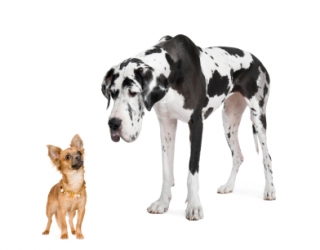Choosing a Dog Part Three: Does Size Matter?

Stop me if you’ve heard this one: “We thought we would get a smaller dog because he would be easier.” It’s even funnier if you’re in the room with a Jack Russell Terrier or a Chihuahua.
So far I have discussed getting a rescue or a puppy from a breeder and the merits of an older dog versus a puppy. How about size?
It’s tough to talk about size without crossing over into the different attributes of many breeds, but I wanted to spend some time on size before going there. Size seems to be a source of a single misconception that looms very large when it comes to choosing the right (or wrong) dog. Let’s tackle it head on.
Smaller dogs are not easier.
Smaller dogs do not necessarily require less exercise. Yes, it might be easier to exercise a small dog in a smaller space, but a smaller dog may require more time exercising because she may have more energy than a larger dog. Many of the smaller breeds also have very "big" and focused personalities and require more mental stimulation than a larger dog.
Smaller dogs also tend to be more difficult to house-train. I’m not really sure why, but I sometimes think that the owners’ contribute to the problem by not being willing to restrict the dog’s freedom, one of the most important first steps that makes house-training easy. However their smaller capacity may have something to do with it too.
But this isn’t meant to be a rant against small dogs! Larger dogs are, well, larger. They do need more room to move and exercise, and unwanted behaviors such as pulling on leash and jumping up for greetings are more annoying and even more potentially dangerous with a larger dog. Many people tolerate considerably more undesirable behavior from smaller dogs — because they can.
When it comes to children and dogs, the question of size represents a bit of a paradox. Smaller dogs can be less dangerous because of their size, not just because of any potential aggression, but also just because a smaller dog will be less apt to accidentally harm a child. But the fast and random movements made by children can be more intimidating to a smaller dog which can lead to bites, and a bite is a bite.
Here again, we have a personal decision. While all dogs, regardless of size or shape, are still dogs, selecting the right size can be important. Give it some thought.
Next Week: Breeds and BS.
Quick Note: I am starting a new project with a few other great pet bloggers. It's called Animal Cafe and features a weekly podcast interview, followed by a weekly online chat with the interview subject. Please take a look!




